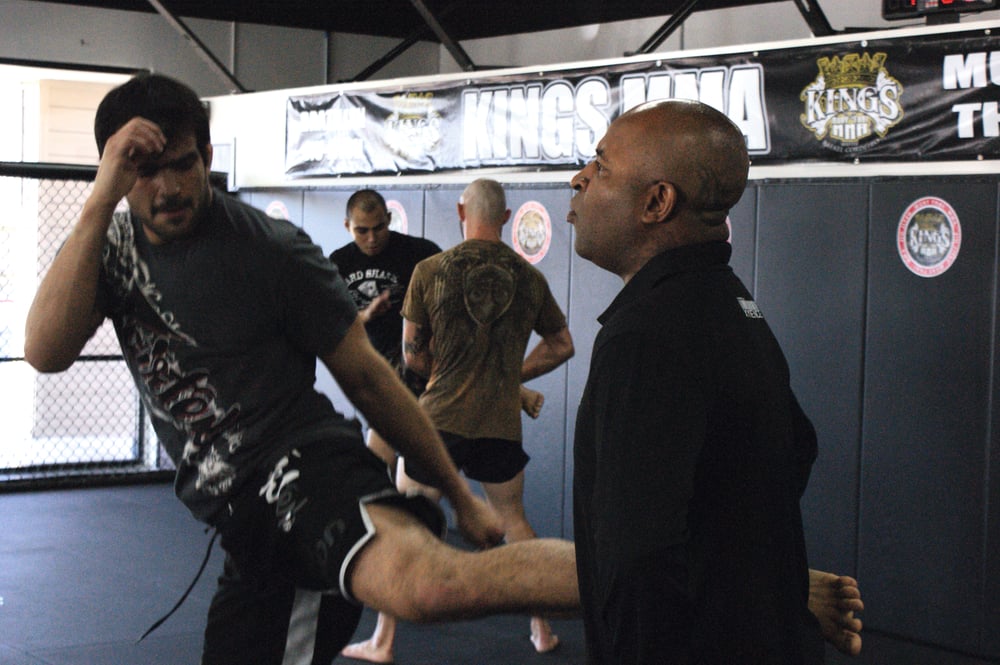
Issue 089
June 2012
Master Rafael Cordeiro may have brought a slice of the legendary Chute Boxe Academy to the West Coast – but his desire to see MMA flourish back in Brazil burns brighter than ever.
A group of men sit listening intently to another who speaks with a gentle intensity. They crane their necks in hard to catch his every word. They are listening to ‘Master’ Rafael Cordeiro. There is something of the mystic, the life guru, about Cordeiro, the 39-year-old martial arts instructor, originally from Curitiba, now based in his own training center in Huntington Beach, California. Kings MMA is where Cordeiro makes dreams come true.
One only need listen to the way in which his pupils speak of him, and to him, to comprehend that the mixed martial arts he assuages is both deep, and meaningful. Life and physical art form are inextricably linked in the philosophy of the former fighter. As a competitor he was affiliated with the famed Chute Boxe Academy and competed in both MMA and Muay Thai. But it appears that as a coach, he found his true calling. He speaks and they – as formidable a group as you could amass – want to listen.
After retiring from fighting, Cordeiro coached at Chute Boxe and oversaw, advised and mentored a modern who’s who of Brazilian greats. They include world champions and world title contenders like Anderson Silva, Wanderlei Silva, Mauricio ‘Shogun’ and Murilo ‘Ninja’ Rua and Fabricio Werdum.
During the days of Japan’s Pride Fighting Championships one vaunted team was known and loved for their aggressive style above all others – the Curitiba-based Chute Boxe. In addition to founder and head trainer Rudimar Fedrigo, Cordeiro was seen as notable for his intellect and insight.
Leaving Chute Boxe to forge his own brand three years ago, the MMA guru began to blend Brazilian craft with American wrestling at Kings MMA, where his new breed include the likes of Jake Ellenberger, the welterweight contender, and Mark Munoz, who is climbing the ladder at middleweight.

Yet he will always be a Brazilian abroad, and he’s proud of it. “2012 could be the year of the Brazilian,” Cordeiro says. “The UFC coming to Brazil last year changed everything. Everyone is feeling inspired by it. You could see that in the two events there. It is like the sport has come home. We created this sport. What we need to do now is find the organization to handle everything. It is the single most important thing, because we don’t have an MMA commission, or a federation. We have great stars, great fighters, but unfortunately we don’t have a great organization in Brazil.
“The UFC have already shown us what can be done there. They have shown the way. What we need to do is form a group and have the major figures involved. I think the first person involved will be Mario Yamasaki. He is the first guy to try and introduce a commission there. He has a great background to do that. We are going to prove it can be done in Brazil. We just need time to start to organize everything.”
The sport has been through a huge transitional period in Brazil, as Cordeiro explains: “What you have to understand is that before, in Brazil, if you were training in MMA, trying to get a career in MMA, they saw you as a guy who didn’t have a job. They looked down on you. ‘He trains because he doesn’t have a job. That guy likes to train to fight in the street. He’s not a good person.’ Those were the feelings towards guys involved in MMA.
“Today, no. We’ve proved that there is a great future for you, if you have balance, desire and dedication. We have proved it is a big, big sport in the world. It can change your life. Not just for money, but by having the martial arts spirit. You go to the gym, you have focus and discipline and training, and then you fight. It teaches people to eat well, to think about the need for sleep and rest. Now – around the world, and in Brazil – young guys look at the sport, and they say, ‘I want to be the champ.’
“MMA is now a great way to change lives. It was football, now it’s fighting. Years ago, every kid wanted to be Pele and then Ronaldo. Now they want to be Anderson Silva. This is true. Now everyone knows about Anderson Silva in Brazil. When Ronaldo [the ex-footballer] signed him as his first client in his group, it changed his life.”
Cordeiro is now exporting Brazilian excellence to California. But does he feel the pull to go home, back to Curitiba, the capital city of the southern state of Parana, breeding ground of Wanderlei, Anderson, Cris ‘Cyborg’ Santos, the Rua brothers? “No. This country opened the door for me. I have 25 years in this sport and the guys in America opened their arms to me. I have a lot of students here, a lot of good friends here. I will just go back to Brazil to visit. I want to stay here in California. I love it here. This is my country now. This is the place where I want to work hard to build my career.” Build it, and they will come... Just as they did in Parana.










